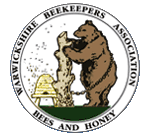BLOOMS AND THE BBKA SPRING CONVENTION
It is that time of year and the warm weather increases all our activity. Like the farmers members always seem to say “alright so far” as long as there isn’t too much wind, rain or frost.
In our area having had a huge reduction in OSR crops in the last two years because of the pesticide issue there seems to be a resurgence. One member made the observation that there are numerous uncultivated field margins that are full of OSR presumably growing as a weed, bit of a bonus in cereal crop fields. If only wildflowers can come through in these patches in the summer it would be a further bonus, borage or linseed as the main crop would be a bigger bonus.
Our April meeting featured Gerry Collins. Members again were treated to a long experienced beekeepers sharing a barrowload of insights and useful tips. Several members commented on that even in areas where they felt comfortable he brought out new insights and tips to improve their bee keeping skills.
Many members attended the BBKA national convention and the conversations were very positive about being back together again. As always there was a tremendous variety from basic knowledge and skills, hive products and wonderful science. Some of us learnt better ways to make wax wraps, their originals being a bit stiff. Others the delights of fermenting honey in a controlled tasty way and not mead. I am not sure I can wait six months to try the gift sample of garlic and ginger I was given.
One of us learnt that advance booking his wax in for the very worthwhile wax exchange was excellent foresight and good organisational skills. However, the system will not work if you forget to take the wax with you!
On the science side the potential negative effect of beekeepers can up in post lecture chats and it was a shock to hear of one piece of research that had found chemicals not used in the UK in wax. The assumption being that this had come in via wax for foundation. The lecture on bees taste produced a great deal of discussion and that bees can distinguish the quality of different nectars. The other interesting research that stimulated discussion was the fact that a colony at any one time will collect a variety of pollens, but generally there are, at any one time, four dominant pollens making up the majority of their pollen collections.
As always there appeared to be an energising effect from the conference.
By Steve Brown
